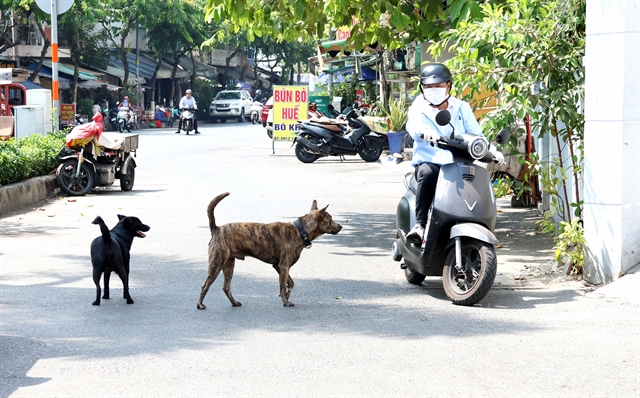 Society
Society

 |
| Dogs roam freely in District 4 in HCM City. — VNA/VNS Photo Đinh Hằng |
HÀ NỘI — Soil-transmitted worm diseases have decreased recently, but parasitic diseases are on the rise, such as roundworms from dogs and cats, large and small liver flukes, pork tapeworms, and beef tapeworms.
The medical update was given by Dr Hoàng Đình Cảnh, Director of the Hà Nội-based National Institute of Malaria, Parasitology and Entomology (NIMPE), adding that Việt Nam currently has about ten types of parasitic diseases.
Soil-transmitted helminthiasis has a long-term, silent impact on health and nutrition, limiting physical, mental and intellectual development of people, affecting their learning and working process, and hindering economic development.
The rate of soil-transmitted helminth infection in the whole country is about 30 per cent, in which northern mountainous and Central Highlands regions have the highest infection rate from 50-84 per cent, followed by central localities with about 30-50 per cent, the localities in the Red River Delta with about 10-30 per cent and the lowest infection rate is in the southern provinces and cities with about 5-20 per cent.
People at particular high risk of infection are preschool children, students and women of childbearing age.
Cảnh told the Nhân Dân (The People) newspaper that the World Health Organization (WHO) is going to give Việt Nam six million deworming pills, which is a 60 per cent reduction compared to last year.
Therefore, the NIMPE suggested the Ministry of Health to send an official dispatch to provinces and cities to proactively use provincial and municipal funds to purchase deworming pills for people at high risk of infection in epidemic areas.
Currently, there are many new parasitic diseases that have not received much attention.
Dog and cat roundworm is a disease caused by raising pets and letting dogs and cats roam freely.
Last year, the Đặng Văn Ngữ Hospital under the NIMPE recorded about 30,000 people coming for examination because of suspected infection with this type of worm.
The cause is from cat and dog faeces released into the environment and infection to humans through the mouth can be due to hugging pets, touching pet fur and gardening without protection.
The worm larvae enter through the skin and then into the blood, lungs, liver and eyes.
At present, it is estimated that around one million people in Việt Nam are infected with small liver flukes due to eating raw, salted or undercooked fish and hundreds of thousands of cases of other parasitic diseases.
Small liver fluke disease can lead to cholangitis, cholecystitis, gallstones, cirrhosis, biliary fibrosis and biliary cancer.
Epidemiological investigations show that the disease is common in 20 provinces and cities in the northern region, 12 provinces and cities in the central and southern regions with an estimated one million infected people.
The main cause is the custom of eating raw fish dishes such as fish salad and pickled fish.
Fascioliasis occurs in 53 out of 60 provinces and cities nationwide. The flukes cause liver abscesses and ectopic fascioliasis can lead to various lesions at the parasitic sites.
Tapeworms are found in 60 out of 63 provinces and cities, with tens of thousands of patients diagnosed and treated nationwide each year. The disease causes damage and symptoms in the central nervous system, eyes, skeletal muscles, heart muscles, liver and kidneys.
"In the Central Highlands, our studies on faecal samples showed that 30 per cent contained liver flukes. If cows have flukes and are not cooked properly, there is a risk of infection. Cow faeces also spread fluke larvae into the environment,” Cảnh told the Nhân Dân (The People) newspaper.
“In Ba Bể Lake in Bắc Kạn Province, 70 per cent of fish tested were infected with liver flukes. If people eat raw or uncooked fish, and aquatic vegetables in this area, the risk of infection with liver flukes is very high, including both large and small liver flukes," he said.
In addition, there are many diseases caused by gnathostomiasis, strongyloidiasis, trichinosis, dragonworm and fungal diseases that are increasingly occurring, causing damage to the liver, brain, lungs, kidneys, digestive tract, causing acute and long-term effects on people's health and leaving a huge disease burden in the community.
Cảnh said that currently, parasitic diseases transmitted from animals to humans are diagnosed and treated at specialised and general treatment facilities, but there was no proper intervention in provinces and cities.
"We do not have systematic funding programme to conduct research to determine the rate of parasitic infection in the community, to help people increase their knowledge and understanding on preventive measures, and to have timely community measures," he said.
Considered a 'silent' disease, Cảnh believes that it is necessary to raise awareness in food safety, especially among people in areas with the habit of eating raw food. People should always eat cooked food, drink boiled water and ensure that their pets are kept clean. — VNS




